Can I Get Married in My Garden? Understanding Backyard Wedding Legality
Tying the knot in the comfort of your own garden can make your big day both personal and picturesque. Many couples are drawn to the idea of a garden wedding, envisioned amidst lush greenery and floral arrangements. It allows you to create a truly intimate and unique atmosphere that can be tailored to your preferences. However, holding a wedding in your garden isn’t as simple as setting a date and sending out invitations; there are preparations and legal logistics that need to be considered to ensure your ceremony is both beautiful and binding.
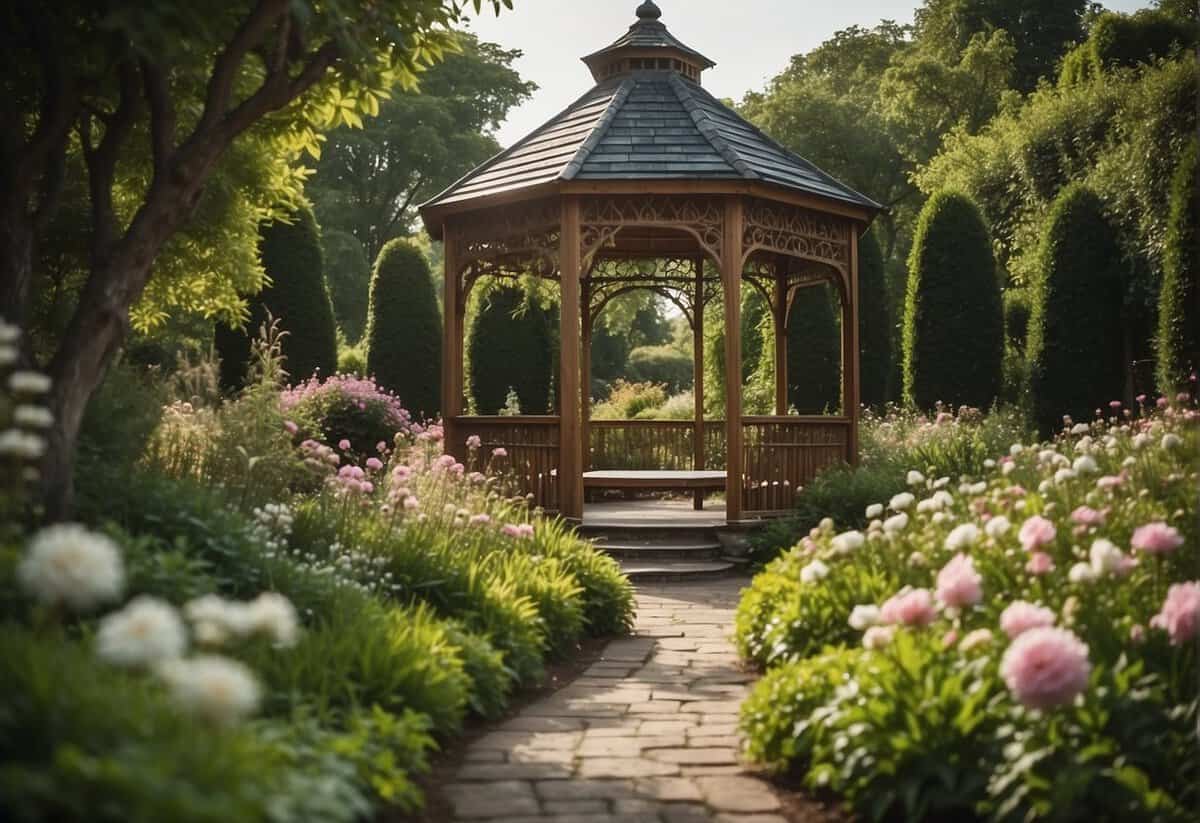
When planning a garden wedding, it’s essential to address the foundations of a successful event. Preparing your garden for the wedding may require landscaping, decorating, and arranging suitable spaces for the ceremony and reception. Additionally, you must navigate the legal requirements to ensure your marriage is officially recognized. Combining these formalities with touches that enhance your guests’ experience will ensure that your garden wedding is a memorable event for everyone involved.
Key Takeaways
- Personalizing your garden for the wedding can reflect your unique style and make the day special.
- It’s important to understand and comply with legalities to ensure your garden wedding is valid.
- Thoughtful planning focused on comfort and enjoyment will leave lasting impressions on your guests.
Preparing Your Garden for the Wedding
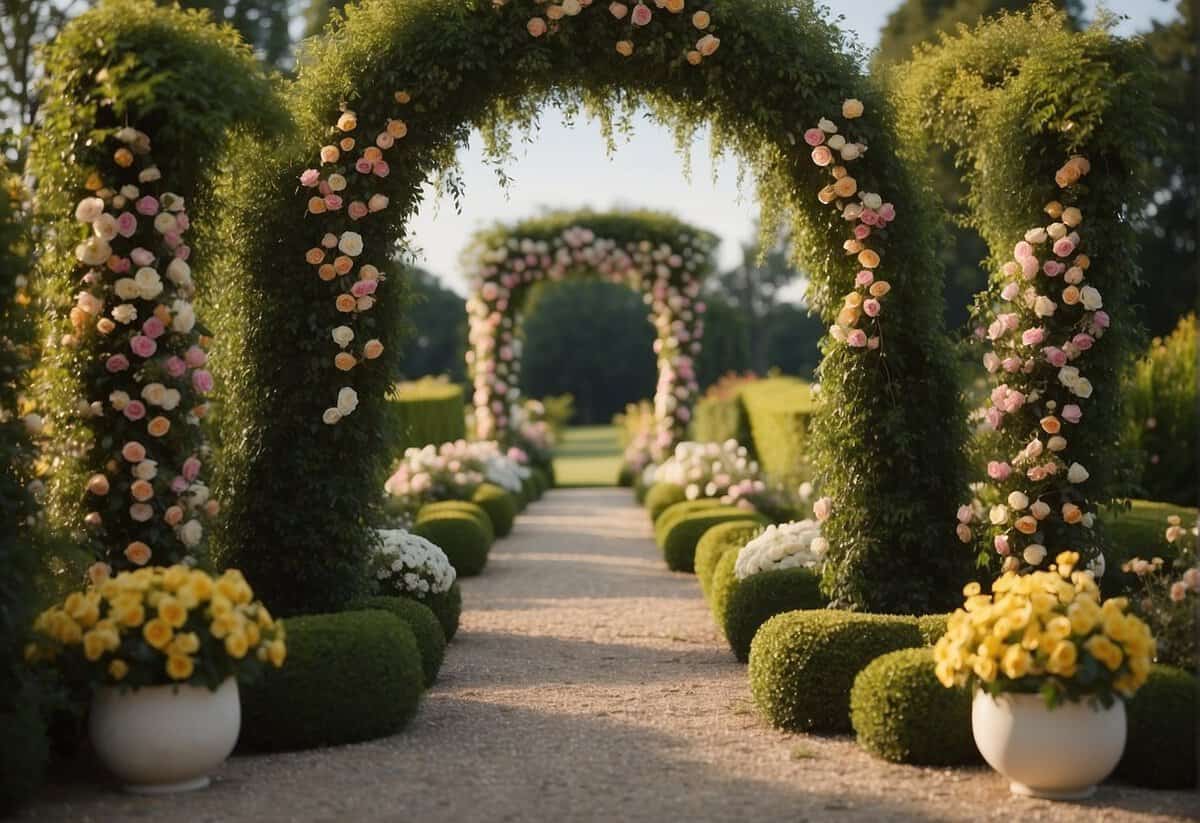
Transforming your garden into the perfect wedding venue takes careful planning and consideration of both practicality and aesthetics. Here, you’ll learn to tailor the space, choose an ideal date while considering weather risks, and select stunning decor to create a magical atmosphere.
Assessing Space and Layout
Before you start with any preparations, evaluate your garden’s space and layout. You need to determine how many guests you can comfortably accommodate. Consider creating different areas for the ceremony, dining, and dancing. Ensure there’s ample room for seating and a clear aisle for the procession. If your garden is on the smaller side, consider a charming, intimate gathering, where every element feels personal and cozy.
Choosing the Date and Understanding Weather Risks
Selecting the right date is crucial for a garden or backyard wedding. May and spring are popular for their moderate weather, but always be prepared for unexpected changes. Research historical weather data for your chosen date. Consider renting tents or marquees as a backup plan for rain or excessive sun. This ensures that no matter the weather, your special day can go on without a hitch.
- Ideal Months: May, June, September, October
- Weather Precautions: Tents, Outdoor Heaters, Cooling Fans, Umbrellas
Garden Decor and Floral Arrangements
Your garden provides a natural backdrop, but adding personal touches with decor and floral arrangements makes the space distinctly yours. String up fairy lights or lanterns for enchanting illumination as the evening settles. Choose flowers that complement your garden’s existing blooms to ensure a seamless and integrated look. Think about utilizing local and seasonal flowers to add freshness and a touch of nature’s finest to your special day. Consider reaching out to experts at places like Martha Stewart who can guide your choices to enhance your garden’s appeal.
- Lighting: Soft, Ambient, Romantic
- Flowers: Seasonal, Local, Color-Coordinated
- Furniture: Functional, Elegant, Complements the Garden
Legal and Logistical Considerations
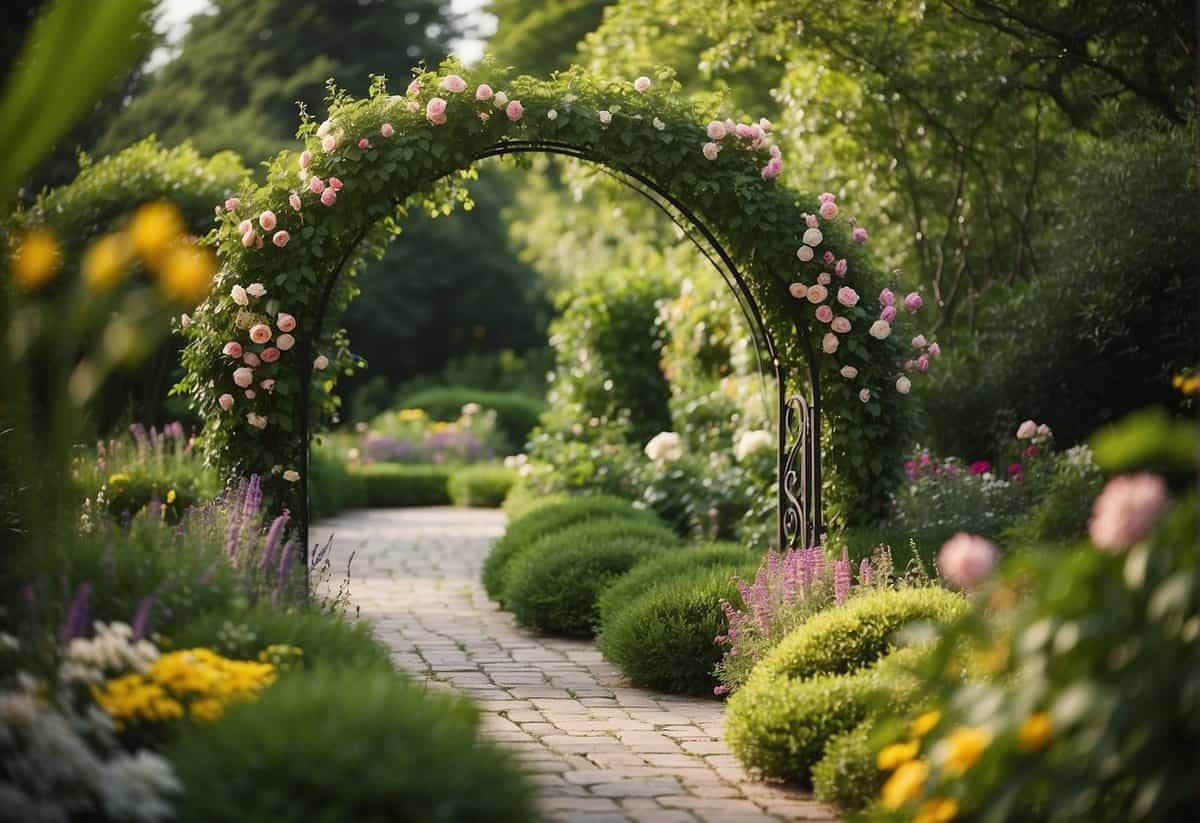
When considering a garden wedding, your focus should be on understanding the legalities to avoid last-minute issues and ensuring guest comfort and contingency plans for weather. Detailed planning will ensure your special day progresses smoothly.
Understanding Local Legislation and Necessary Permits
It’s important for you to understand the local legislation regarding residential events. In some areas, zoning laws may affect your ability to host a wedding at home. You may need necessary permits or approvals, especially if your garden isn’t a licensed venue for weddings. To avoid any legal issues, check with your local authorities on whether you can legally conduct such events in your garden.
Wedding Amenities and Guest Comfort
You want your guests to have a memorable time. Comfort is key, so consider amenities like portable restrooms as restrooms often become a necessity for outdoor events. A generator may be required for electricity needs. Plus, you’ll want to have adequate seating, shade, or heating options to accommodate the expected temperature changes throughout the day.
Dealing with Nature and Unpredictable Weather
Outdoor weddings mean contending with nature. Have a backup plan for rain or wind, such as a marquee or an indoor alternative. It’s wise to share weather-appropriate attire suggestions with your guests ahead of time. Consider hiring a wedding planner who can efficiently manage the unpredictability of an outdoor setting and coordinate any last-minute changes to ensure your wedding runs smoothly.
Enhancing Guest Experience
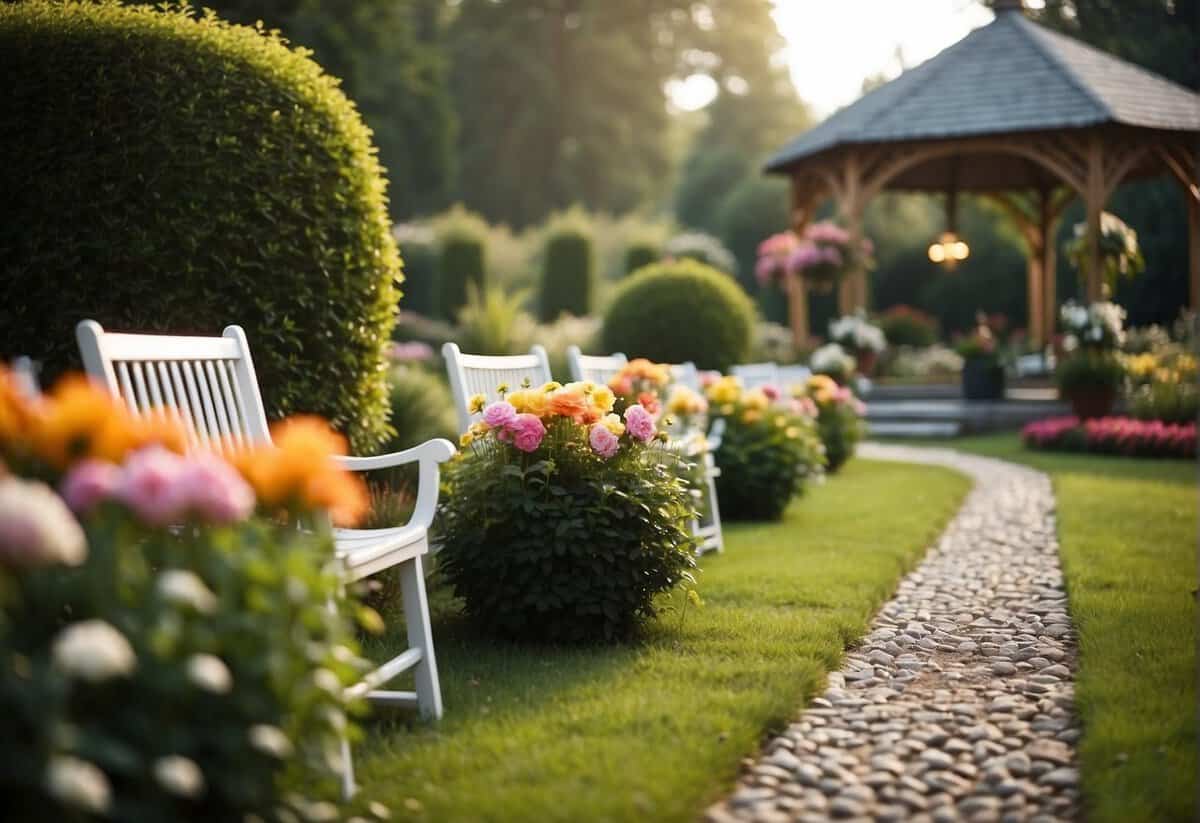
Making sure your guests are comfortable and entertained throughout your garden wedding is essential. Attention to detail in seating arrangements, climate control, and audio-visual elements will significantly enhance the overall experience.
Seating and Shelter
To ensure your guests are seated comfortably, provide ample seating that integrates well with the outdoor environment. Consider renting tents to offer shade and protection from potential inclement weather. Arrange seats strategically so that everyone has a clear view of the ceremony. For added ambience, consider a dance floor placement that feels organic within your garden’s layout.
Temperature Control and Comfort
Unexpected weather changes can impact guest comfort. Be prepared with fans or portable heaters to regulate the temperature. To cater to individual needs, have blankets available for cooler evenings or create shaded areas with tents and natural elements like trees for hotter days. Adequate water stations are essential to keep guests hydrated.
Lighting and Sound
Good lighting is crucial as the day turns into evening. Use soft lights to illuminate paths and highlight features of your garden without disrupting the natural aesthetic. Speakers should be set up for optimal sound, allowing music and vows to be heard clearly without overpowering your guests’ conversations. Lastly, advise your guests to wear suitable footwear like flats or wedges to navigate the garden terrain easily.
Final Touches for Your Garden Wedding
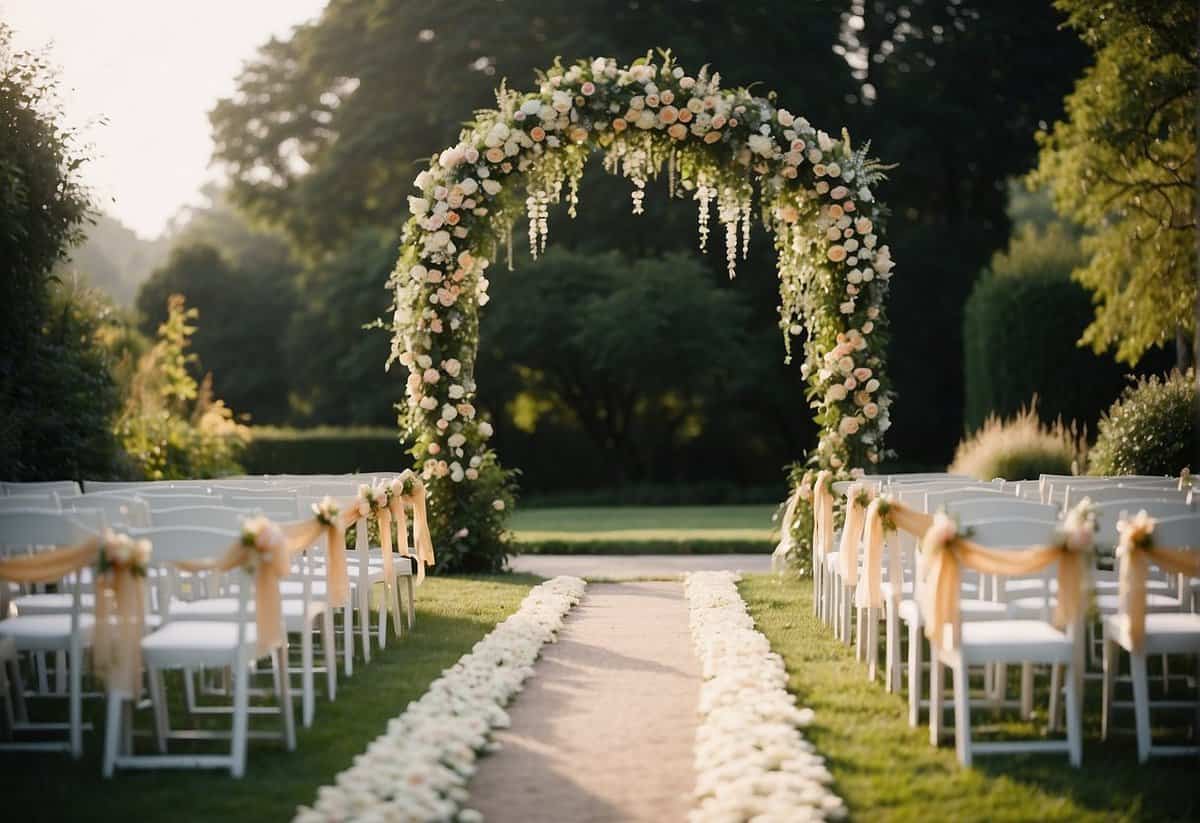
After you’ve taken care of the major components of your garden wedding, it’s time to focus on the final touches that will ensure your big day is as seamless and personal as possible. These finishing details will make your celebration unforgettable for both you and your guests.
Managing Parking and Transportation
To reduce the impact on your neighborhood and avoid frustrating your guests, organize parking options ahead of time. If your garden space is limited, consider renting a nearby lot or arranging for a shuttle service from a local parking area. Clearly communicate these details on your wedding website and include maps or guides with your invitations.
Options for Parking:
- Rent nearby lots
- Shuttle service
- Valet parking (if budget allows)
Communicate:
- Display parking info on wedding website
- Include maps with invitations
Ensuring Smooth Event Flow and Timeline
A well-organized timeline not only keeps the event flowing smoothly but also helps manage the expectations of service providers and guests. Coordinate with your wedding planner or a trusted friend to oversee the timeline, so you can enjoy your special day. Remember to account for the extra time that might be needed due to your wedding’s unique location, like escorting guests to their seats or managing potential distractions from natural beauty.
- Event Flow Checklist:
- Ceremony start and end time
- Cocktail hour duration
- Reception kick-off
- Speeches and dances
- Alcohol service cut-off time
Personalizing Wedding Details
Incorporate DIY decor like handmade centerpieces or custom napkins to reflect your personality. When selecting fresh flowers, choose varieties that complement the existing natural beauty of your garden. Don’t forget to have a plan for bugs, perhaps with decorative citronella candles or providing guests with bug spray, to keep pests from intruding on your celebration. Finally, brief your photography team about the areas you love most in your garden so they can capture the setting and special moments against the perfect backdrop.
- Personal Touches:
- DIY or custom decorations
- Fresh flowers and natural arrangements
- Bug repellent solutions
- Intimate lighting for evening ambiance
By handling these specifics, your garden wedding will not only be beautiful but smooth and comfortable for everyone involved.
Frequently Asked Questions

When planning a garden wedding, it’s essential to know the specific requirements and legal stipulations. This section aims to address your most pressing questions to ensure you can confidently plan your special day.
What are the requirements for having a garden wedding?
To host a garden wedding, you need to consider attire suitable for the terrain, inform your hairstylist and makeup artist about the outdoor conditions, and ensure your guests are aware of the appropriate attire for the event.
Is it possible to have a legal wedding ceremony in my own backyard?
While you can have a wedding ceremony in your backyard, the legality of the marriage depends on your local jurisdiction. Typically, you’d have to register your marriage legally at a local registry office in conjunction with your informal backyard ceremony.
How can one organize a backyard wedding on a budget?
Organizing a backyard wedding on a budget requires careful planning. You can cut costs by diy decorations, using your garden’s natural beauty as the backdrop, and being mindful of guest list size, catering choices, and entertainment options.
Are there special considerations for a garden wedding in the UK?
In the UK, a garden wedding requires certain stipulations to be met for it to be legally recognized. You should check with your local council regarding the possibility of an outdoor ceremony, as specific guidelines vary across the country.
What steps should be taken to turn a backyard into a wedding venue?
Transforming your backyard into a wedding venue involves several steps: ensuring the space is clean and well-groomed, setting up a sheltered area in case of inclement weather, arranging seating and a focal point for the ceremony, and organizing the necessary amenities for your guests’ comfort.
Can you have a legally binding wedding ceremony in any outdoor location?
You cannot have a legally binding wedding ceremony in just any outdoor location; the spot must be approved and adhere to local laws and regulations. It’s crucial to research and confirm what is permitted in your area before proceeding with your plans.

